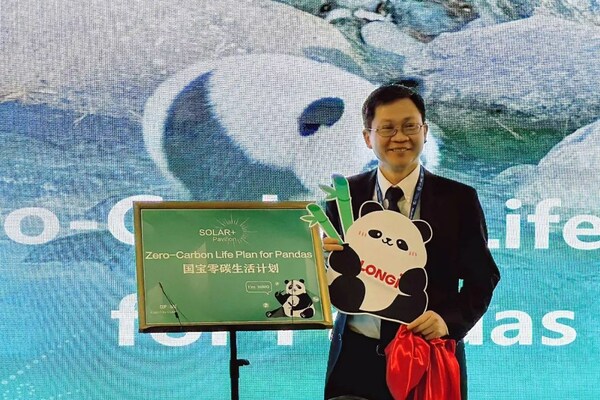DUBAI, United Arab Emirates, Dec. 7, 2023 /PRNewswire/ -- LONGi Green Energy Technology Co., Ltd. (LONGi), a global leader in solar technology, today announced its new "Zero-Carbon Life Plan for Pandas" aimed at preserving biodiversity in China's Qinling Mountains. The plan includes a new partnership agreement with Shaanxi Foping National Nature Reserve and will focus on supporting panda conservation efforts at the reserve.
"As a leader in sustainable development through clean energy, LONGi is committed to exploring innovative ways we can use our technology to support environmental protection," said Li Zhenguo, Founder and President of LONGi. "This special initiative is a great example of how LONGi is collaborating with new partners to realize our vision of a zero-carbon world while also supporting conservation efforts for one of China's national treasures: the panda."
As a part of the agreement, LONGi will donate solar power plant with its latest module product of Hi-MO X6 for the nature reserve's facilities to provide clean energy for scientists and researchers in support of their important conservation efforts. The "Panda Power Plant" will harness the sun's energy to contribute to sustainable energy generation for the Foping National Nature Reserve. LONGi will also adopt its own "HiMO Panda" to show how scientists and researchers are leveraging solar power to care for the panda over the course of its life.

Jiang Dongyu, Vice President of DBG, LONGi,unveiled the "Zero-carbon Life Plan for Pandas" at the Solar+ Pavilion during the COP28 in Dubai,UAE.
"We are incredibly grateful to have a new partnership with LONGi to begin transforming our national nature reserve to become carbon neutral," said Dang Gaodi, Senior Engineer at Shaanxi Foping National Nature Reserve. "This is a great example of how NGOs and the Private Sector can come together to leverage different strengths to achieve a common goal."
The "Zero-Carbon Life Plan for Pandas" also aligns with other global efforts to promote sustainable development. In particular, the "Zero-Carbon Life Plan" was created with the UN's 17 Sustainable Development Goals in mind, specifically the goal 15 "Life on Land," which aims to protect, restore and promote sustainable use of terrestrial ecosystems, sustainably manage forests, combat desertification, and halt and reverse land degradation and halt biodiversity loss.
"LONGi is committed to being a leader not only in the clean energy space but also in promoting environmental protection," said Jiang Dongyu, Vice President of Distributed Business Group of LONGi. "We hope that through investments like the one we are making with the Shaanxi Foping National Nature Reserve, we can open the door to more possible partnerships with NGOs and researchers to show how solar technology can support biodiversity conservation around the world."
About LONGi
Founded in 2000, LONGi is committed to being the world's leading solar technology company, focusing on customer-driven value creation for full scenario energy transformation.
Under its mission of 'making the best of solar energy to build a green world', LONGi has dedicated itself to technology innovation and established five business sectors, covering mono silicon wafers cells and modules, commercial & industrial distributed solar solutions, green energy solutions and hydrogen equipment. The company has honed its capabilities to provide green energy and has more recently, also embraced green hydrogen products and solutions to support global zero carbon development.
About Shaanxi Foping National Nature Reserve
The Shaanxi Foping National Nature Reserve (FPNR) was established in 1978. The reserve is located in the northwest of Foping County, the southern foot of the middle Qinling Mountains, with a forest coverage rate of more than 98.0%, which is a forest and wildlife type reserve mainly for the protection of giant pandas. It has also been listed as the national popular science education base for teenagers and the field teaching experimental base of Shaanxi Normal University. It has carried out multi-level and multi-directional cooperation with many research units.
 Pages you might like
Pages you might like








 Latest information
Latest information
 Follow official account
Follow official account
 Online support
Online support
 鄂ICP备2022017323号
鄂ICP备2022017323号
 鄂公网安备 42018502006493
鄂公网安备 42018502006493
 Launch Exhibition
Launch Exhibition
 Release information
Release information



 Today's topic
Today's topic








